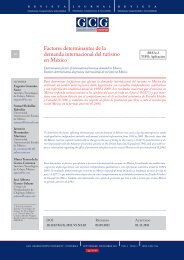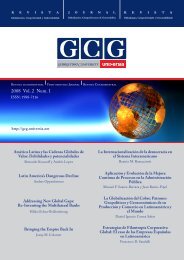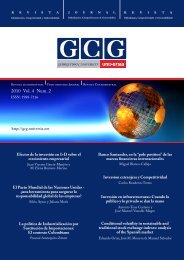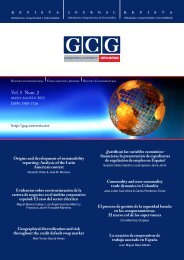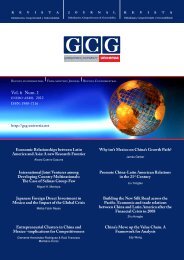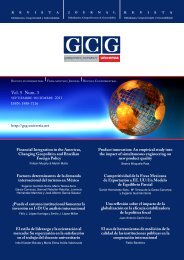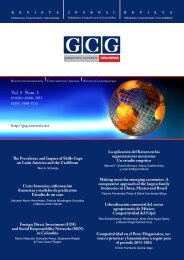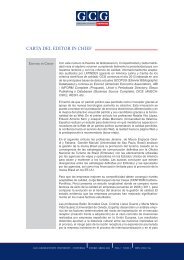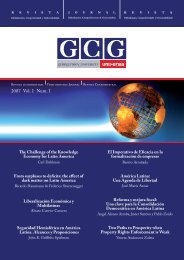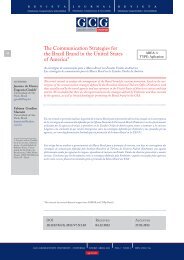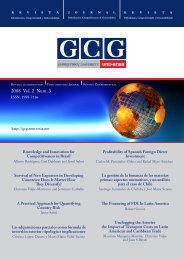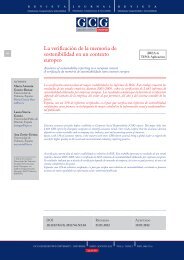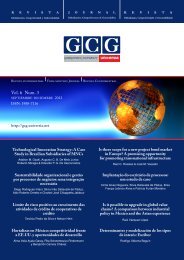2010 Vol. 4 Num. 1 - GCG: Revista de Globalización, Competitividad ...
2010 Vol. 4 Num. 1 - GCG: Revista de Globalización, Competitividad ...
2010 Vol. 4 Num. 1 - GCG: Revista de Globalización, Competitividad ...
You also want an ePaper? Increase the reach of your titles
YUMPU automatically turns print PDFs into web optimized ePapers that Google loves.
Degree of Internationalization and performance: Evi<strong>de</strong>nce from emerging Brazilian multinational firms<br />
42 The major findings are summarized as follows:<br />
• Positive relationship: Higher levels of internationalization are associated with positive<br />
returns. Firms <strong>de</strong>ploy their intangible assets to explore market imperfections in<br />
foreign countries.<br />
• Negative relationship: Higher levels of internationalization are associated with negative<br />
returns, mainly when internationalization is done by Greenfield project. This<br />
contradictory finding can be explained by Agency Theory, as managers may invest<br />
in international projects that <strong>de</strong>stroy value, to be able to capture cash flows from<br />
owners.<br />
• Inexistent Relationship: Internationalization and performance are not correlated.<br />
• S-Curve Hypothesis: Internationalization produces positive returns up to a certain<br />
level of investment in international operations. Further from that point, there is an<br />
escalation of managerial costs, and the marginal product of internationalization becomes<br />
negative. There is a dynamic interplay between costs and benefits of internationalization,<br />
so the resulting relationship with performance is a cyclical S-curve.<br />
• Inverted U-Curve: Based on the incremental mo<strong>de</strong>l <strong>de</strong>veloped by Uppsala school,<br />
this theory postulates that internationalization starts on geographic adjacent countries,<br />
where the business environment is more familiar to firms, and returns are<br />
prone to be positive. When entering in more complex markets, firms begin to face<br />
managerial difficulties that end up compromising returns. Eventually the marginal<br />
cost of international expansion will exceed the marginal benefits. The relationship<br />
between internationalization and performance would take an inverted U curve.<br />
As mentioned before, the vast majority of studies analyzed multinational firms from <strong>de</strong>veloped<br />
countries. What would be the relationship between internationalization and performance<br />
for firms located in an emerging economy, like Brazil?<br />
3. Method<br />
3.1. Sample<br />
To un<strong>de</strong>rstand the effect of internationalization on performance, it is required to analyze<br />
how internationalization evolves over time. For that reason, the sampling process was done<br />
in ways to inclu<strong>de</strong> multinationals that have been in foreign markets for some consi<strong>de</strong>rable<br />
period. The sampling was done by convenience. Six Brazilian multinationals were studied.<br />
These are very traditional companies, consolidated in the business market. Companies studied<br />
are:<br />
<strong>GCG</strong> GEORGETOWN UNIVERSITY - UNIVERSIA <strong>2010</strong> VOL. 4 NUM. 1 ISSN: 1988-7116



